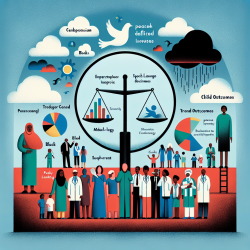Introduction
In the ever-evolving landscape of special education, it is easy to feel lost amid the myriad of challenges that educators, parents, and advocacy groups face. However, the rise of technology and online therapy services has introduced a beacon of hope, offering new tools and opportunities to create meaningful change. As a passionate advocate for data-driven decisions, I am excited to share insights on how creating and utilizing effective tools can transform outcomes for children in special education.
The Role of Online Therapy in Special Education
Online therapy, also known as telepractice, has emerged as a powerful tool in the realm of special education. By leveraging technology, therapy services can be delivered remotely, providing flexibility and accessibility to schools and families who may otherwise struggle to access these crucial services. This innovation is not just a trend; it is a data-backed solution that has been shown to improve outcomes for children with special needs.
Data-Driven Success
Research consistently supports the effectiveness of online therapy. Studies indicate that telepractice is as effective as in-person therapy, with the added benefits of convenience and increased reach. For example, a 2022 study published in the Journal of Speech, Language, and Hearing Research found that children receiving online speech therapy showed comparable improvements to those receiving face-to-face therapy.
Moreover, data from TinyEYE, a leading provider of online therapy services, reveals that schools utilizing telepractice have reported improved student engagement and satisfaction. This is a testament to the power of integrating technology into special education, where personalized, data-driven approaches can make a significant difference.
Creating Tools for Advocacy
For special education advocacy groups, the challenge lies in navigating complex systems and advocating for the best possible outcomes for children. Here, the creation of tools and resources becomes paramount. By equipping advocates with the right information and strategies, we can empower them to make informed decisions and push for necessary changes in educational policies and practices.
- Resource Libraries: Develop comprehensive libraries of resources, including research articles, case studies, and best practice guidelines to support informed advocacy.
- Training Programs: Offer training sessions and workshops on the latest advancements in online therapy and special education tools.
- Collaboration Platforms: Create online platforms where advocates can share insights, collaborate on initiatives, and support each other's efforts.
Conclusion
In the quest to create great outcomes for children in special education, it is essential to harness the power of technology and data-driven tools. Online therapy is not just a solution; it is a transformative approach that can bridge gaps and create opportunities for success. By focusing on creating and utilizing effective tools, advocacy groups can navigate the complexities of special education with confidence and clarity.
As we continue to develop and refine these tools, let us remain committed to our shared goal: ensuring that every child, regardless of their challenges, has access to the support and resources they need to thrive.










